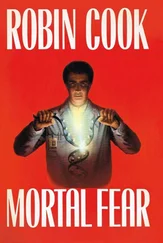Carol Bigelow reappeared.
“Okay, Lisa, we’re ready for you.”
“Please,” whispered Lisa.
“Come now, Lisa,” said Carol Bigelow. “You wouldn’t want Dr. Mannerheim to see you crying.”
Lisa didn’t want anyone to see her crying. She shook her head in response to Carol Bigelow’s question, but her emotion switched to anger. Why was this happening to her? It wasn’t fair. A year ago she’d been a normal college girl. She’d decided to major in English, hopefully to prepare for law school. She loved her literature courses and had been a superior student, at least until she’d met Jim Conway. She knew she’d let her studies go, but it had only been a month or so. Before meeting Jim she’d had sex on several occasions, but it had never been satisfying and she’d questioned why there was so much fuss about it. But with Jim it had been different. She knew immediately that with Jim, sex was the way it was supposed to be. And she hadn’t been irresponsible. She did not believe in the Pill, but she’d made the effort to be fitted with a diaphragm. She could remember very distinctly how hard it had been for her to find the courage to make that first GYN clinic visit and go back when it was necessary.
The gurney moved into the operating room. It was completely square, about twenty-five feet on a side. The walls were constructed of gray ceramic tile up to the glass-faced gallery above. The ceiling was dominated by two large stainless steel operating room lights shaped like inverted kettle drums. In the center of the room stood the operating table. It was a narrow, ugly piece of equipment, reminding Lisa of an altar for some pagan rite. At one end of the table was a round piece of padding with a hole in the center, which Lisa instinctively knew was to hold her head. Totally out of keeping with the environment, the Bee Gees crooned from a small transistor radio in the corner.
“There, now,” said Carol Bigelow. “What I want you to do is slide over here onto the table.”
“Okay,” said Lisa. “Thank you.” She was annoyed at her response. Thank you was the farthest thing from her mind. Yet she wanted the people to like her because she knew she depended on them to take care of her. Moving from the gurney to the operating table, Lisa held on to the sheet in a vain attempt to retain a modicum of dignity. Once on the table she lay still, staring up at the operating lights. Just to the side of the lights she recognized the glass partitions. Because of reflections, it was difficult to see through the glass, but then she saw the faces staring down at her. Lisa closed her eyes. She was a spectacle.
Her life had become a nightmare. Everything had been wonderful until that fateful evening. She had been with Jim and they both had been studying. Progressively, she had become aware that she was having difficulty reading, particularly when she came to a specific sentence beginning with the word “Ever.” She was certain she knew the word but her mind refused to give it to her. She had to ask Jim. His response was a smile, thinking she was teasing. After she persisted, he told her “ever.” Even after Jim had told her the word, when she looked at its printed form, it wouldn’t come to her. She remembered feeling a powerful sense of frustration and fear. Then she began to smell the strange odor. It was a bad smell, and although she sensed she’d smelled it before, she could not say what it was. Jim denied smelling anything and that was the last thing Lisa remembered. What had followed was her first seizure. Apparently it had been awful, and Jim was shaking when she regained consciousness. She had struck him several times and scratched his face.
“Good morning, Lisa,” said a pleasant male voice with an English accent. Looking up behind her, Lisa met the dark eyes of Dr. Bal Ranade, an Indian doctor who had trained at the university. “You remember what I told you last night?”
Lisa nodded. “No coughing or sudden movements,” said Lisa, eager to please. She remembered Dr. Ranade’s visit vividly. He’d appeared after her dinner, announcing himself as the anesthesiologist who was going to take care of her during her operation. He had proceeded to ask her the same questions about her health she’d answered many times before. The difference was that Dr. Ranade did not seem to be interested in the answers. His mahogany face did not change its expression, except when Lisa described her appendectomy at age eleven. Dr. Ranade nodded when Lisa said she’d had no trouble with the anesthesia. The only other information that interested him was her lack of allergic reaction. He nodded then too.
Usually Lisa preferred outgoing people. Dr. Ranade was the opposite. He expressed no emotion, just a quiet intensity. But for Lisa, under the circumstances this cool affectation was appropriate. She was glad to find someone for whom her ordeal was routine. But then Dr. Ranade had shocked her. In the same precise Oxford accent he said: “I presume that Dr. Mannerheim has discussed with you the anesthetic technique which will be used.”
“No,” said Lisa.
“That’s odd,” said Dr. Ranade at length.
“Why?” asked Lisa, sensing trouble. The idea that there could be any breakdown in communication was alarming. “Why is that odd?”
“We usually use a general anesthesia for craniotomy,” said Dr. Ranade. “But Dr. Mannerheim has informed us that he wants local anesthesia.”
Lisa had not heard her operation described as a craniotomy. Dr. Mannerheim had said he was going to “turn a flap” and make a small window in her head so that he could remove the damaged part of her right temporal lobe. He’d told Lisa that somehow, a part of Lisa’s brain had been damaged, and it was that section that was causing her seizures. If he could take just the damaged part out the seizures would stop. He’d done almost a hundred such operations with wonderful results. At the time Lisa had been ecstatic because up until Dr. Mannerheim all she could get from her doctors was compassionate head shaking.
And the seizures were horrible. Usually she knew when they were coming because she would smell the strangely familiar odor. But sometimes they came without warning, descending on her like an avalanche. Once in a movie theater, after she’d been given a long course of heavy medication and assurances that the problem was under control, she smelled the horrid odor. In a panic she’d jumped up, stumbled to the aisle, and ran back toward the lobby. At that point she became unaware of her actions. Later she “came to” propped up against the lobby wall by the candy machine, with her hand between her legs. Her clothes were partially off, and like a cat in heat, she’d been masturbating. A group of people was staring at her as if she were a freak, including Jim, whom she’d punched and kicked. Later she learned she’d assaulted two girls, injuring one enough to be hospitalized. At the time she’d “come to” all she could do was close her eyes and cry. Everyone was afraid to come near her. In the distance she remembered hearing the sound of the ambulance. She thought that she was going insane.
Lisa’s life had come to a standstill. She wasn’t insane, but no medication controlled her seizures. So when Dr. Mannerheim appeared, he seemed like a savior. It wasn’t until Dr. Ranade’s visit that she began to comprehend the reality of what was going to happen to her. After Dr. Ranade, an orderly had arrived to shave her head. From that moment on, Lisa had been frightened.
“Is there some reason why he wants local anesthesia?” asked Lisa. Her hands had begun to tremble. Dr. Ranade had thought carefully about his answer.
“Yes,” he said finally, “he wants to locate the diseased part of your brain. He needs your help.”
“You mean, I’ll be awake when...” Lisa didn’t finish her sentence. Her voice had trailed off. The idea seemed preposterous.
Читать дальше












